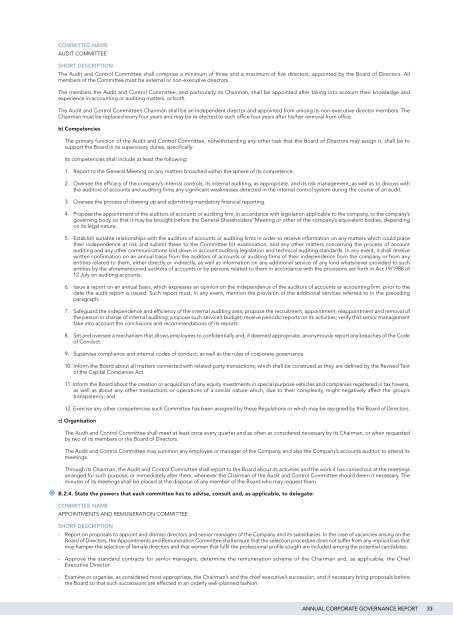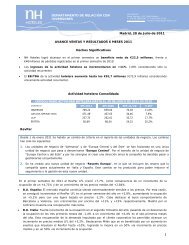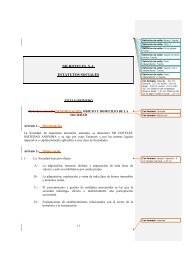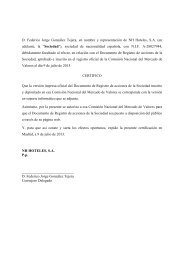Consolidated Financial Statements and Consolidated Management ...
Consolidated Financial Statements and Consolidated Management ...
Consolidated Financial Statements and Consolidated Management ...
You also want an ePaper? Increase the reach of your titles
YUMPU automatically turns print PDFs into web optimized ePapers that Google loves.
Committee name<br />
AUDIT COMMITTEE<br />
Short description<br />
The Audit <strong>and</strong> Control Committee shall comprise a minimum of three <strong>and</strong> a maximum of five directors, appointed by the Board of Directors. All<br />
members of the Committee must be external or non-executive directors.<br />
The members the Audit <strong>and</strong> Control Committee, <strong>and</strong> particularly its Chairman, shall be appointed after taking into account their knowledge <strong>and</strong><br />
experience in accounting or auditing matters, or both.<br />
The Audit <strong>and</strong> Control Committee’s Chairman shall be an independent director <strong>and</strong> appointed from among its non-executive director members. The<br />
Chairman must be replaced every four years <strong>and</strong> may be re-elected to such office four years after his/her removal from office.<br />
b) Competencies<br />
The primary function of the Audit <strong>and</strong> Control Committee, notwithst<strong>and</strong>ing any other task that the Board of Directors may assign it, shall be to<br />
support the Board in its supervisory duties, specifically:<br />
Its competencies shall include at least the following:<br />
1. Report to the General Meeting on any matters broached within the sphere of its competence.<br />
2. Oversee the efficacy of the company’s internal controls, its internal auditing, as appropriate, <strong>and</strong> its risk management, as well as to discuss with<br />
the auditors of accounts <strong>and</strong> auditing firms any significant weaknesses detected in the internal control system during the course of an audit.<br />
3. Oversee the process of drawing up <strong>and</strong> submitting m<strong>and</strong>atory financial reporting.<br />
4. Propose the appointment of the auditors of accounts or auditing firm, in accordance with legislation applicable to the company, to the company’s<br />
governing body so that it may be brought before the General Shareholders’ Meeting or other of the company’s equivalent bodies, depending<br />
on its legal nature.<br />
5. Establish suitable relationships with the auditors of accounts or auditing firms in order to receive information on any matters which could place<br />
their independence at risk <strong>and</strong> submit these to the Committee for examination, <strong>and</strong> any other matters concerning the process of account<br />
auditing <strong>and</strong> any other communications laid down in account auditing legislation <strong>and</strong> technical auditing st<strong>and</strong>ards. In any event, it shall receive<br />
written confirmation on an annual basis from the auditors of accounts or auditing firms of their independence from the company or from any<br />
entities related to them, either directly or indirectly, as well as information on any additional service of any kind whatsoever provided to such<br />
entities by the aforementioned auditors of accounts or by persons related to them in accordance with the provisions set forth in Act 19/1988 of<br />
12 July on auditing accounts.<br />
6. Issue a report on an annual basis, which expresses an opinion on the independence of the auditors of accounts or accounting firm, prior to the<br />
date the audit report is issued. Such report must, in any event, mention the provision of the additional services referred to in the preceding<br />
paragraph.<br />
7. Safeguard the independence <strong>and</strong> efficiency of the internal auditing area; propose the recruitment, appointment, reappointment <strong>and</strong> removal of<br />
the person in charge of internal auditing; propose such service’s budget; receive periodic reports on its activities; verify that senior management<br />
take into account the conclusions <strong>and</strong> recommendations of its reports<br />
8. Set <strong>and</strong> oversee a mechanism that allows employees to confidentially <strong>and</strong>, if deemed appropriate, anonymously report any breaches of the Code<br />
of Conduct.<br />
9. Supervise compliance <strong>and</strong> internal codes of conduct, as well as the rules of corporate governance<br />
10. Inform the Board about all matters connected with related-party transactions, which shall be construed as they are defined by the Revised Text<br />
of the Capital Companies Act.<br />
11. Inform the Board about the creation or acquisition of any equity investments in special purpose vehicles <strong>and</strong> companies registered in tax havens,<br />
as well as about any other transactions or operations of a similar nature which, due to their complexity, might negatively affect the group’s<br />
transparency; <strong>and</strong><br />
12. Exercise any other competencies such Committee has been assigned by these Regulations or which may be assigned by the Board of Directors.<br />
c) Organisation<br />
The Audit <strong>and</strong> Control Committee shall meet at least once every quarter <strong>and</strong> as often as considered necessary by its Chairman, or when requested<br />
by two of its members or the Board of Directors.<br />
The Audit <strong>and</strong> Control Committee may summon any employee or manager of the Company, <strong>and</strong> also the Company’s accounts auditor, to attend its<br />
meetings.<br />
Through its Chairman, the Audit <strong>and</strong> Control Committee shall report to the Board about its activities <strong>and</strong> the work it has carried out at the meetings<br />
arranged for such purpose, or immediately after them, whenever the Chairman of the Audit <strong>and</strong> Control Committee should deem it necessary. The<br />
minutes of its meetings shall be placed at the disposal of any member of the Board who may request them.<br />
B.2.4. State the powers that each committee has to advise, consult <strong>and</strong>, as applicable, to delegate:<br />
Committee name<br />
APPOINTMENTS AND REMUNERATION COMMITTEE<br />
Short description<br />
- Report on proposals to appoint <strong>and</strong> dismiss directors <strong>and</strong> senior managers of the Company <strong>and</strong> its subsidiaries. In the case of vacancies arising on the<br />
Board of Directors, the Appointments <strong>and</strong> Remuneration Committee shall ensure that the selection procedure does not suffer from any implicit bias that<br />
may hamper the selection of female directors <strong>and</strong> that women that fulfil the professional profile sought are included among the potential c<strong>and</strong>idates.<br />
- Approve the st<strong>and</strong>ard contracts for senior managers; determine the remuneration scheme of the Chairman <strong>and</strong>, as applicable, the Chief<br />
Executive Director.<br />
- Examine or organise, as considered most appropriate, the Chairman’s <strong>and</strong> the chief executive’s succession, <strong>and</strong> if necessary bring proposals before<br />
the Board so that such successions are effected in an orderly well-planned fashion.<br />
ANNUAL CORPORATE GOVERNANCE REPORT 33
















